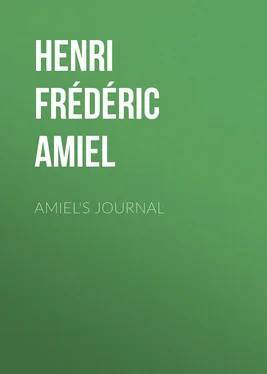Henri Frédéric Amiel - Amiel's Journal
Здесь есть возможность читать онлайн «Henri Frédéric Amiel - Amiel's Journal» — ознакомительный отрывок электронной книги совершенно бесплатно, а после прочтения отрывка купить полную версию. В некоторых случаях можно слушать аудио, скачать через торрент в формате fb2 и присутствует краткое содержание. Издательство: Иностранный паблик, Жанр: literature_19, foreign_antique, foreign_prose, Зарубежные любовные романы, на английском языке. Описание произведения, (предисловие) а так же отзывы посетителей доступны на портале библиотеки ЛибКат.
- Название:Amiel's Journal
- Автор:
- Издательство:Иностранный паблик
- Жанр:
- Год:неизвестен
- ISBN:нет данных
- Рейтинг книги:5 / 5. Голосов: 1
-
Избранное:Добавить в избранное
- Отзывы:
-
Ваша оценка:
- 100
- 1
- 2
- 3
- 4
- 5
Amiel's Journal: краткое содержание, описание и аннотация
Предлагаем к чтению аннотацию, описание, краткое содержание или предисловие (зависит от того, что написал сам автор книги «Amiel's Journal»). Если вы не нашли необходимую информацию о книге — напишите в комментариях, мы постараемся отыскать её.
Amiel's Journal — читать онлайн ознакомительный отрывок
Ниже представлен текст книги, разбитый по страницам. Система сохранения места последней прочитанной страницы, позволяет с удобством читать онлайн бесплатно книгу «Amiel's Journal», без необходимости каждый раз заново искать на чём Вы остановились. Поставьте закладку, и сможете в любой момент перейти на страницу, на которой закончили чтение.
Интервал:
Закладка:
Henri Frédéric Amiel
Amiel's Journal: The Journal Intime of Henri-Frédéric Amiel
PREFACE TO THE SECOND EDITION
In this second edition of the English translation of Amiel’s “Journal Intime,” I have inserted a good many new passages, taken from the last French edition ( Cinquiéme édition, revue et augmentée .) But I have not translated all the fresh material to be found in that edition nor have I omitted certain sections of the Journal which in these two recent volumes have been omitted by their French editors. It would be of no interest to give my reasons for these variations at length. They depend upon certain differences between the English and the French public, which are more readily felt than explained. Some of the passages which I have left untranslated seemed to me to overweight the introspective side of the Journal, already so full—to overweight it, at any rate, for English readers. Others which I have retained, though they often relate to local names and books, more or less unfamiliar to the general public, yet seemed to me valuable as supplying some of that surrounding detail, that setting, which helps one to understand a life. Besides, we English are in many ways more akin to Protestant and Puritan Geneva than the French readers to whom the original Journal primarily addresses itself, and some of the entries I have kept have probably, by the nature of things, more savor for us than for them.
M. A. W.PREFACE
This translation of Amiel’s “Journal Intime” is primarily addressed to those whose knowledge of French, while it may be sufficient to carry them with more or less complete understanding through a novel or a newspaper, is yet not enough to allow them to understand and appreciate a book containing subtle and complicated forms of expression. I believe there are many such to be found among the reading public, and among those who would naturally take a strong interest in such a life and mind as Amiel’s, were it not for the barrier of language. It is, at any rate, in the hope that a certain number of additional readers may be thereby attracted to the “Journal Intime” that this translation of it has been undertaken.
The difficulties of the translation have been sometimes considerable, owing, first of all, to those elliptical modes of speech which a man naturally employs when he is writing for himself and not for the public, but which a translator at all events is bound in some degree to expand. Every here and there Amiel expresses himself in a kind of shorthand, perfectly intelligible to a Frenchman, but for which an English equivalent, at once terse and clear, is hard to find. Another difficulty has been his constant use of a technical philosophical language, which, according to his French critics, is not French—even philosophical French—but German. Very often it has been impossible to give any other than a literal rendering of such passages, if the thought of the original was to be preserved; but in those cases where a choice was open to me, I have preferred the more literary to the more technical expression; and I have been encouraged to do so by the fact that Amiel, when he came to prepare for publication a certain number of “Pensées,” extracted from the Journal, and printed at the end of a volume of poems published in 1853, frequently softened his phrases, so that sentences which survive in the Journal in a more technical form are to be found in a more literary form in the “Grains de Mil.”
In two or three cases—not more, I think—I have allowed myself to transpose a sentence bodily, and in a few instances I have added some explanatory words to the text, which wherever the addition was of any importance, are indicated by square brackets.
My warmest thanks are due to my friend and critic, M. Edmond Scherer, from whose valuable and interesting study, prefixed to the French Journal, as well as from certain materials in his possession which he has very kindly allowed me to make use of, I have drawn by far the greater part of the biographical material embodied in the Introduction. M. Scherer has also given me help and advice through the whole process of translation—advice which his scholarly knowledge of English has made especially worth having.
In the translation of the more technical philosophical passages I have been greatly helped by another friend, Mr. Bernard Bosanquet, Fellow of University College, Oxford, the translator of Lotze, of whose care and pains in the matter I cherish a grateful remembrance.
But with all the help that has been so freely given me, not only by these friends but by others, I confide the little book to the public with many a misgiving! May it at least win a few more friends and readers here and there for one who lived alone, and died sadly persuaded that his life had been a barren mistake; whereas, all the while—such is the irony of things—he had been in reality working out the mission assigned him in the spiritual economy, and faithfully obeying the secret mandate which had impressed itself upon his youthful consciousness: “ Let the living live; and you, gather together your thoughts, leave behind you a legacy of feeling and ideas; you will be most useful so .”
MARY A. WARD.INTRODUCTION
It was in the last days of December, 1882, that the first volume of Henri Frédéric Amiel’s “Journal Intime” was published at Geneva. The book, of which the general literary world knew nothing prior to its appearance, contained a long and remarkable Introduction from the pen of M. Edmond Scherer, the well-known French critic, who had been for many years one of Amiel’s most valued friends, and it was prefaced also by a little Avertissement , in which the “Editors”—that is to say, the Genevese friends to whom the care and publication of the Journal had been in the first instance entrusted—described in a few reserved and sober words the genesis and objects of the publication. Some thousands of sheets of Journal, covering a period of more than thirty years, had come into the hands of Amiel’s literary heirs. “They were written,” said the Avertissement , “with several ends in view. Amiel recorded in them his various occupations, and the incidents of each day. He preserved in them his psychological observations, and the impressions produced on him by books. But his Journal was, above all, the confidant of his most private and intimate thoughts; a means whereby the thinker became conscious of his own inner life; a safe shelter wherein his questionings of fate and the future, the voice of grief, of self-examination and confession, the soul’s cry for inward peace, might make themselves freely heard.
“… In the directions concerning his papers which he left behind him, Amiel expressed the wish that his literary executors should publish those parts of the Journal which might seem to them to possess either interest as thought or value as experience. The publication of this volume is the fulfillment of this desire. The reader will find in it, not a volume of Memoirs , but the confidences of a solitary thinker, the meditations of a philosopher for whom the things of the soul were the sovereign realities of existence.”
Thus modestly announced, the little volume made its quiet début . It contained nothing, or almost nothing, of ordinary biographical material. M. Scherer’s Introduction supplied such facts as were absolutely necessary to the understanding of Amiel’s intellectual history, but nothing more. Everything of a local or private character that could be excluded was excluded. The object of the editors in their choice of passages for publication was declared to be simply “the reproduction of the moral and intellectual physiognomy of their friend,” while M.
Читать дальшеИнтервал:
Закладка:
Похожие книги на «Amiel's Journal»
Представляем Вашему вниманию похожие книги на «Amiel's Journal» списком для выбора. Мы отобрали схожую по названию и смыслу литературу в надежде предоставить читателям больше вариантов отыскать новые, интересные, ещё непрочитанные произведения.
Обсуждение, отзывы о книге «Amiel's Journal» и просто собственные мнения читателей. Оставьте ваши комментарии, напишите, что Вы думаете о произведении, его смысле или главных героях. Укажите что конкретно понравилось, а что нет, и почему Вы так считаете.












